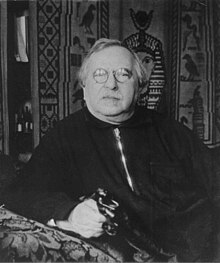Constantin Brunner
| Constantin Brunner | |
|---|---|
 |
|
| Born |
27 August 1862 Altona, Germany |
| Died | 27 August 1937 (aged 75) The Hague, Netherlands |
| Era | Modern philosophy |
| Region | Western philosophy |
|
Notable ideas
|
the three faculties of thought (the practical, the intellectual, the analogical) |
Constantin Brunner (1862–1937) was the pen-name of the German Jewish philosopher Arjeh Yehuda Wertheimer (called Leo). He was born in Altona (near Hamburg) on 27 August 1862. He came from a prominent Jewish family that had lived in the vicinity of Hamburg for generations; his grandfather, Akiba Wertheimer, was chief Rabbi of Altona and Schleswig-Holstein. Brunner studied philosophy under a number of prominent scholars, but never completed his doctorate. He established himself as a literary critic, and enjoyed a wide celebrity. In the 1890s, he withdrew from public life to devote himself to writing. He lived in Germany until 1933, when, with the rise to power of the Nazi party, he moved to The Hague, where he died on 27 August 1937.
Central to Brunner’s theory is the characterization of three different modes of mental activity:
Each of the three modes of thought consists of three specificates. In the practical understanding, the specificates are feeling, knowing and willing. In spiritual life, these are modified to become, respectively, art, philosophy and mysticism (love). Superstition distorts the specificates of spiritual life, transforming them into religion, metaphysics and moralism.
Brunner's intention is to contrast popular thought with spiritual/intellectual thought. His work Die Lehre von den Geistigen und vom Volke is a survey of the whole of human intellectual history seen from the point of view of this doctrine.
Brunner's ultimate objective was to prepare the way for the establishment of a community centered on the life of the mind, which would in turn open the way to the expansion of democracy.
The opposition between the spiritual and the religious is a major theme in Brunner's work. He contends that Judaism is essentially anti-religious, stating in Our Christ that "Judaism as a spiritual doctrine is the opposite of religion and a protest against it", and culminates his argument with his own translation of the Shema: "Hear O Israel, Being is our god, Being is one". He juxtaposes priestly/pharisaic/rabbinic to prophetic Judaism, stating that the latter represents the true mystical essence in opposition to the former which distorts that essence.
...
Wikipedia
